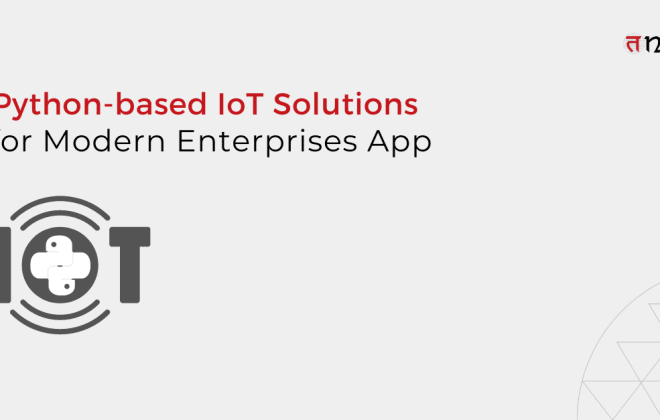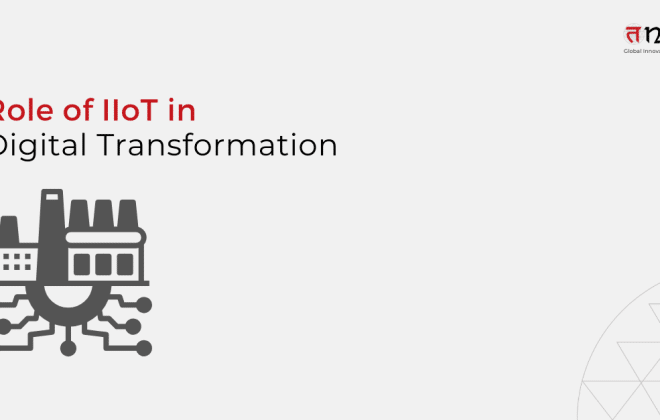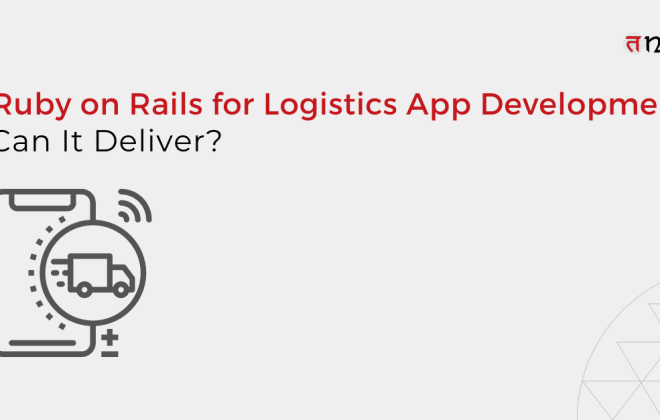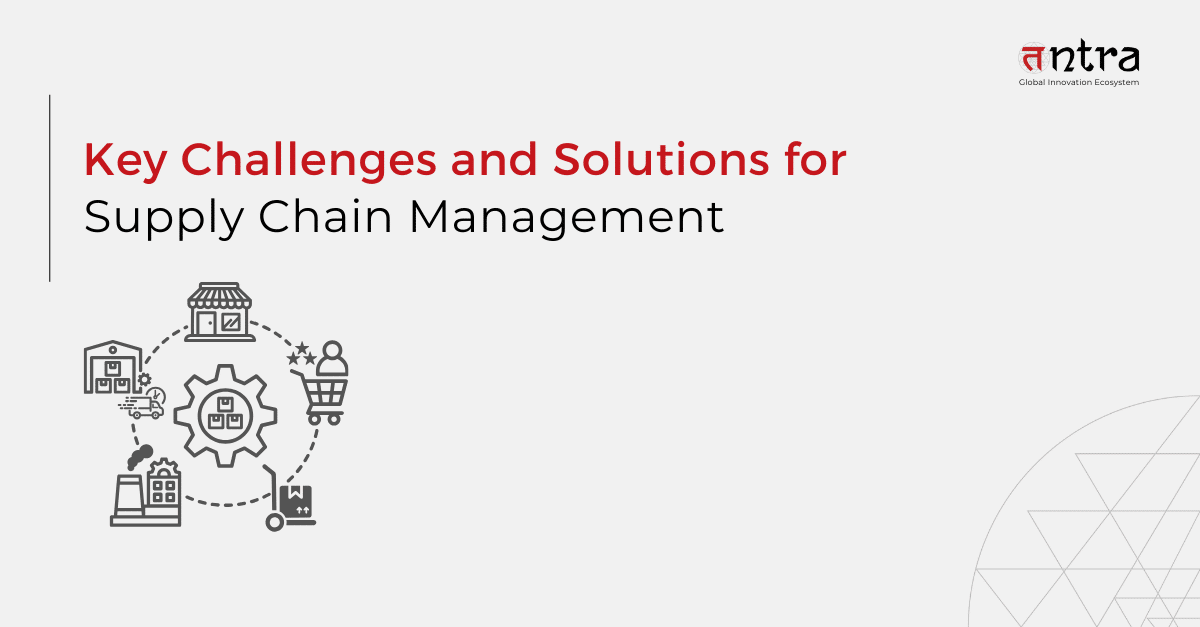
Key Challenges and Solutions for Supply Chain Management
Table of Contents
ToggleWhile trying to understand Singapore’s complex supply chain management challenges like regional cooperation, data sharing, sustainability, and eCommerce growth emerge. Supply chain management software solutions developers apply cutting-edge techniques, enhancing the dependability and affordability of current models. Their expertise aligns technology with supply chain needs, offering custom solutions. Companies like Tntra’s approach, blending AI, DLT, and IoT, promise enhanced supply chain management in Singapore.
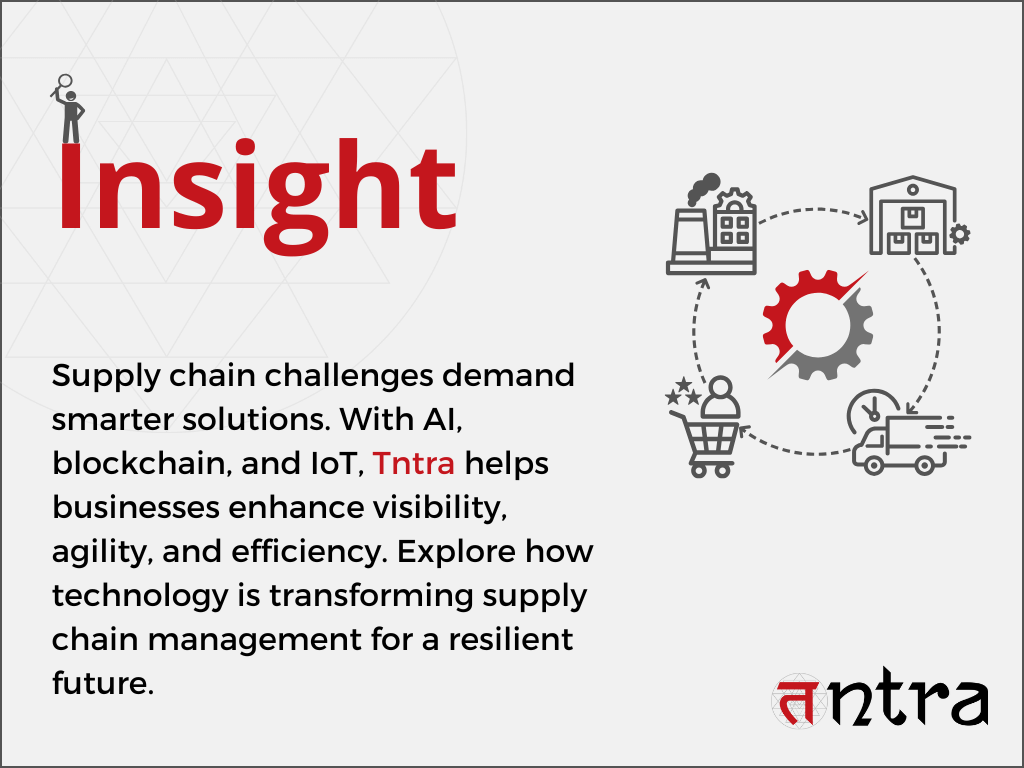
Turning Supply Chain Challenges into Opportunities with Technology
Have you ever stopped to think about why supply chain management is more crucial than ever? With everything from geopolitical uncertainty disrupting trade routes to inflation driving up costs, businesses worldwide are facing supply chain management challenges. In today’s highly connected world, even a minor disruption in the global supply chain can ripple across industries, causing supply chain disruptions and production setbacks.
However, these supply chain challenges for businesses also present opportunities for growth. By leveraging supply chain optimization, companies can enhance agility, control costs, and maintain customer satisfaction—even amid market fluctuations. Digital transformation in supply chain management plays a key role, providing real-time supply chain visibility into inventory, logistics, and operational efficiencies.
If you’re unsure where to start, technology-driven solutions like advanced planning systems, IoT sensors, and AI-powered analytics can help tackle challenges in supply chain management, ensuring seamless operations and future-ready logistics.
YCH Group: Pioneering Innovation in Supply Chain Management
YCH Group is a family-owned trucking company that began operating in 1945. The group has become Singapore’s largest home-grown supply chain solutions provider and a trusted partner for numerous global brands across Asia.
YCH Group’s steadfast dedication to innovation, technology, and customer-centricity has fueled its success. By embracing digital solutions such as AI/ML and IoT, it has been able to improve its warehouse management, freight tracking, and more, YCH Group has empowered its clients with unparalleled efficiency and supply chain visibility. It recently partnered with Fieldbox.ai, an AI operator, to improve the productivity of staff and assets in YCH warehouses using AI-driven solutions.
The committed team of professionals at the organization works directly with clients to comprehend their specific requirements and provide customized supply chain solutions that maximize effectiveness, affordability, and sustainability. The customer-centric strategy of YCH Group has earned the trust of prominent global businesses.
Supply chain management software solutions enable companies like the YCH Group to play an even bigger role as Singapore keeps reaffirming its status as a worldwide center for transport and logistics.
Source: YCH Group
Logistics Evolution: A Backdrop to Supply Chain Challenges
Singapore’s freight and logistics market size was estimated at USD 61.77 billion in 2022 and is anticipated to register a growth rate of 4.32%, reaching a value of USD 84.7 billion by 2028.
The eCommerce sector in Singapore has been growing each year. The Gross Merchandise Value (GMV) of Singapore’s e-commerce industry has increased dramatically, from $2.5 billion in 2019 to an astounding $6.2 billion in 2022. This has been a major contributing factor to the swift evolution of the supply chain in Singapore.
To provide digital and automated solutions for small and medium-sized enterprises (SMEs) that lack the resources of large businesses, Singapore initiated the S$18 million Supply Chain 4.0 Initiative in 2021. This offers supply chain software development services a chance to offer creative fixes.
As the hub for logistics in the Asia-Pacific (APAC) region and the leader of one of the most important trade routes in the world, Singapore has continued to play a key role in the global supply chain sector. PwC estimates that by 2030, APAC economies will be involved in 16 of the top 20 bilateral trade routes globally, with a combined trade value of $4.7 trillion. It is projected that trading routes in Asia will account for almost 80% of global logistics value.
Singapore is committed to maintaining its standing in the Asia-Pacific (APAC) logistics industry. Through its $4.5 billion Industry restructuring Programme, the Singaporean government has started a complete restructuring of the logistics sector to accomplish this goal. The main goals are to develop a strong pool of local logistics expertise, lead innovation, and promote excellence in logistics operations. This transformation of the logistics landscape is anticipated to create over 2,000 new job opportunities and bring $8.3 billion in value to the Industry. Software product engineering solutions will be crucial in propelling this revolutionary process.
Key Challenges in Supply Chain Management in Singapore
In today’s fast-paced global economy, supply chain management is becoming increasingly complex due to rapid technological advancements, changing customer demands, and unpredictable disruptions. Businesses must leverage digital transformation in supply chain operations to stay competitive and resilient. Below are some of the most critical supply chain challenges and how companies can overcome them using AI in supply chain, blockchain in logistics, IoT in supply chain, and predictive analytics.
1. Demand Forecasting and Inventory Optimization
Accurate demand forecasting in supply chain is essential for maintaining an optimal demand-supply balance. However, market fluctuations, seasonal variations, and unforeseen global events make it difficult to predict customer demand accurately. Traditional methods often result in either excess inventory, increasing storage costs, or stockouts, leading to lost sales. Leveraging AI-driven forecasting, predictive analytics in logistics, and machine learning in supply chain can help businesses enhance inventory demand planning and improve supply chain agility.
2. Supply Chain Disruptions and Supplier Diversification
Disruptions caused by geopolitical instability, pandemics, and natural disasters can halt operations and escalate costs. Additionally, material shortages can impact production cycles, leading to revenue losses. Companies can mitigate these risks by implementing a multi-sourcing strategy and prioritizing supplier diversification. Integrating blockchain in logistics and real-time tracking enables businesses to monitor supplier performance and ensure timely deliveries. Cloud-based SCM solutions further enhance visibility and supply chain agility.
3. Real-Time Supply Chain Visibility and Data-Driven Decision-Making
A fragmented supply chain with limited real-time supply chain visibility leads to inefficiencies and delays. Many businesses struggle with supply chain collaboration due to outdated tracking systems. Implementing IoT in supply chain and ERP for supply chain can provide end-to-end real-time tracking, ensuring data-driven supply chain decision-making. Additionally, big data in logistics allows businesses to optimize operations and improve efficiency across multiple touchpoints.
4. Regulatory Compliance and Sustainability in Logistics
Navigating complex and evolving regulations related to trade policies, safety standards, and environmental concerns is a significant challenge. Companies must comply with regional and international sustainability standards while maintaining operational efficiency. Implementing blockchain in logistics can ensure transparency, while digital transformation in supply chain enables automated compliance monitoring. Additionally, supply chain software solutions can streamline regulatory processes and improve sustainability tracking.
5. Meeting Customer Expectations with AI-Powered Logistics
Consumers today demand faster deliveries, personalized experiences, and transparent tracking. Traditional supply chains often struggle to meet these expectations. Businesses must adopt AI in supply chain for predictive analytics in logistics, real-time tracking, and warehouse automation to streamline fulfillment. Implementing logistics software powered by cloud-based SCM solutions enhances delivery efficiency, improving overall customer satisfaction.
6. Labor Shortages and Warehouse Automation
A growing shortage of skilled labor in manufacturing, warehousing, and transportation is causing supply chain bottlenecks. Companies must invest in warehouse automation, robotics, and AI-driven workforce management to address this issue. Supply chain software solutions can help optimize labor allocation, reducing dependency on manual processes while ensuring inventory optimization.
7. Port Congestion and Logistics Delays
Port congestion, transportation inefficiencies, and customs clearance delays disrupt the flow of goods, leading to increased costs. Businesses can tackle these challenges by adopting predictive analytics in logistics, AI-powered logistics software, and big data in logistics to optimize route planning. Implementing blockchain in logistics also enhances transparency in cross-border trade, minimizing customs-related delays.
Unlock the Future of Digital Transformation!
Explore Tntra’s expert insights on modernizing systems, leveraging AI, and driving innovation. Stay ahead in 2025 with our comprehensive Digital Transformation Guide.
Read more
The Path Forward: Digital Transformation for a Resilient Supply Chain
As businesses prepare for the future, embracing digital transformation will be key to overcoming these supply chain challenges. AI-powered logistics, real-time data analytics, automation, and blockchain transparency are transforming supply chains into agile, customer-centric, and resilient ecosystems. Companies that proactively invest in smart logistics solutions and next-gen technologies will gain a competitive edge in an increasingly uncertain world.
To future-proof your supply chain, it’s time to assess your current operations, partner with technology innovators, and implement cutting-edge solutions. The future of supply chain management isn’t just about overcoming obstacles—it’s about turning challenges into opportunities for growth and efficiency.
Solutions for Supply Chain Management Challenges
1. Embracing Innovation
Embracing AI in supply chain, blockchain in logistics, and IoT in supply chain can revolutionize traditional operations. Digital transformation in supply chain opens doors to real-time tracking and more robust analytics.
- AI-Driven Predictive Analytics: Forecast sales and inventory needs with increased accuracy, minimizing stockouts.
- Blockchain: Enhance supply chain transparency by securely recording transactions, reducing fraud, and ensuring product authenticity.
2. Diversifying Suppliers and Inventory Management
A multi-sourcing approach combined with inventory optimization enables supply chain agility. Firms that diversified their networks of suppliers—particularly at times of disruption—have reported faster recovery from disruption and less downtime.
- Case Study: Some electronics manufacturers switched to multiple suppliers across geographies, significantly minimizing the disruption from geopolitical tensions.
- Warehouse Automation: Automation through robotics and autonomous systems maintains an even flow of merchandise, striking an optimal demand-supply balance.
It is evident that today, businesses in Singapore face a growing array of challenges in managing their supply chains. Supply chain management has become increasingly complex, from reconciling diverse economic, regulatory, and cultural conditions to addressing data security concerns and balancing ESG objectives. To effectively address these challenges, businesses need to adopt sophisticated software solutions that can streamline processes, enhance visibility, and optimize decision-making across the entire value chain.
3. Improving Demand Forecasting
Accurate demand forecasting in supply chain is more important than ever. AI-based forecasting uses machine learning on historical data to provide improved inventory demand planning across industries ranging from retail to healthcare.
- Accuracy Gains: Predictive models improve their forecasts over time by learning from continuous sales patterns.
- Proactive Reactions: With greater visibility, logistics staff can redirect shipments, manage inventory levels, and prevent overstock or stockouts at a high cost.
4. Enhancing Collaboration and Data Management
A supply chain backed by data mandates free flow of information between suppliers, manufacturers, and logistics companies. Cloud-based SCM solutions reduce complexity, whereas ERP for supply chain systems integrate data from a variety of sources.
- Cognitive Decision Centers: Intelligent analytics centers that enable time-sensitive decision-making with real-time supply chain conditions.
- Success Story: One global retailer lowered delivery times by 25% using big data in logistics and improved supply chain cooperation.
Transform your logistics workflow with efficiency. Read our Document Processing Case Study for seamless freight forwarding!
The Role of Supply Chain Management Software in the Future
As digitalization speeds up, supply chain software and logistics software solutions are becoming more relevant to scalable and transparent operations. Tntra is a company that specializes in software development according to the unique needs of contemporary supply chains, assisting businesses in incorporating sophisticated analytics and automation. Ranging from managing real-time alerts to route planning optimization, these platforms cater to both present pain points and potential future opportunities. Whether expanding your international presence or building local sourcing, digital transformation of supply chain management software is the key to tapping into unseen efficiency and resilience.
The Future of Supply Chain: Embracing Digital Transformation
The increasing complexity of global supply chains demands innovation and agility. Digitalization is reshaping industry norms, driven by eCommerce growth, rising customer expectations, and evolving market dynamics. Traditional logistics models face challenges such as supply chain inefficiencies, inventory management problems, freight and transportation delays, and supplier dependency risks. To stay competitive, businesses must embrace AI-driven supply chain optimization, smart logistics solutions, and end-to-end supply chain visibility.
Companies leveraging predictive analytics in supply chain, IoT for real-time tracking, and blockchain for secure logistics are setting new industry benchmarks. Cloud-based supply chain management and warehouse automation strategies further enhance operational efficiency and resilience.
Tntra, a leading software product engineering company, accelerates this transformation by providing cutting-edge solutions, including AI-driven demand forecasting, predictive analytics, and digital supply chain transformation. By integrating Industry 4.0 supply chain solutions, businesses can optimize operations, enhance cost-effectiveness, and drive sustainability.
Contact our experts today to explore how Tntra’s supply chain technology solutions can future-proof your logistics and operations.
FAQs
What are the common challenges in supply chain management?
Common supply chain challenges include:
- Supply chain disruptions (e.g., geopolitical issues, natural disasters)
- Inventory management problems (overstocking or stockouts)
- Demand forecasting issues (fluctuating consumer demand)
- Supplier dependency risks (limited supplier options)
- Freight and transportation delays (logistics bottlenecks)
- Compliance and regulatory hurdles (changing trade regulations)
- Lack of real-time visibility (inefficient tracking of goods)
To overcome these, businesses must adopt AI-driven analytics, IoT-based tracking, and predictive supply chain optimization.
How do you solve supply chain challenges?
Solving supply chain challenges requires a strategic approach:
- Improve demand forecasting with AI and data analytics
- Enhance visibility using IoT and cloud-based platforms
- Strengthen supplier networks by diversifying sources
- Automate warehouse operations to reduce errors and costs
- Optimize logistics through predictive analytics and smart routing
- Use blockchain for secure transactions and traceability
Implementing these digital supply chain solutions ensures resilience and agility.
What is the biggest challenge you are facing in your supply chain?
The biggest challenge in supply chains varies by industry but often includes:
- Supply chain disruptions (e.g., pandemics, political instability)
- Freight and transportation delays due to fuel costs or capacity limits
- Inventory mismanagement, leading to inefficiencies
- Data silos that limit real-time decision-making
Businesses can overcome these by leveraging end-to-end supply chain visibility, AI-driven forecasting, and cloud-based SCM.
What are the key issues in SCM?
Key supply chain management (SCM) issues include:
- Demand-supply imbalances, leading to stock issues
- Logistics inefficiencies, increasing transportation costs
- Lack of transparency, making risk management difficult
- Compliance challenges, requiring constant regulatory updates
- Technological gaps, limiting process optimization
Modern SCM requires smart logistics solutions, blockchain for security, and predictive analytics for efficiency.
How to improve supply chain efficiency?
To enhance supply chain efficiency:
- Implement automation for warehouse and logistics management
- Leverage AI-driven analytics for better demand forecasting
- Use IoT sensors for real-time tracking of shipments
- Optimize procurement with data-driven supplier selection
- Adopt cloud-based supply chain management for seamless coordination
By integrating AI, IoT, and digital transformation, businesses can create a more agile, cost-effective supply chain.
How do you solve supply chain bottlenecks?
To eliminate supply chain bottlenecks:
- Identify weak points using AI-based supply chain analytics
- Improve inventory management to prevent shortages
- Enhance logistics coordination with predictive routing
- Strengthen supplier relationships to ensure consistent supply
- Invest in real-time data for better decision-making
Adopting AI-driven supply chain optimization, smart logistics solutions, and automation helps mitigate delays and inefficiencies.
